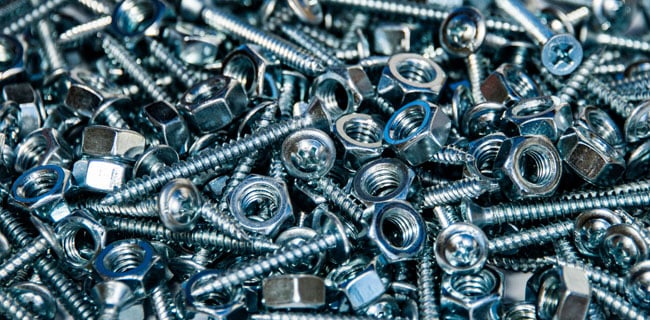Ever have a connection or joint go bad and not sure why? Many times, a connection gives out due to a poor selection and design or errors in the assembly process. Fasteners are usually the least expensive components involved in fabrication, building or manufacturing goods. Unfortunately, because they are the least expensive, they often don’t receive the attention they need.
Below, we share some tips and tricks for better installation and joint stability when using fasteners.
How to choose the right fastener for the job.
Operators usually know what they are looking for when it comes to fastener selection. Maybe it’s just a replacement bolt or screw that is needed for repair. Other times, projects require reverse engineering to make a new or existing connection stronger and more secure. The sheer number of fastener choices can be overwhelming.
When is a permanent rivet a better option over a nut and bolt? Heavy-duty applications like constructing buildings, bridges and skyscrapers have relied on rivets for decades. Or, will a removable nut and bolt provide adequate joint stability for your project? What about screws, staples and nails? The options are near endless.
Related: How Do I Choose the Right Bolt? Bolt Selection Tips from Superior Industrial Supply
For instance, cap screws have several “SAE grades”, namely Grade 2, Grade 5 and Grade 8. Each grade can be found on the head of the cap screw and represents a different diameter, material and heat treatment. Each grade increases in tensile strength.
Grade 2
| Diameters: | ¼” – ¾” ¾” – 1-½” |
| Material and Heat Treatment: | Low or medium carbon steel |
| Tensile Strength: | 60,000 psi |
Grade 5
| Diameters: | ¼” – 1″ 1″ – 1-½” |
| Material and Heat Treatment: | Medium carbon steel quenched and tempered |
| Tensile Strength: | 120,000 psi |
| Metric Equivalent: | 8.8 |
Grade 8
| Diameters: | ¼” – 1-½” |
| Material and Heat Treatment: | Medium carbon alloy steel quenched and tempered |
| Tensile Strength: | 180,000 psi |
| Metric Equivalent: | 10.9 |
What’s more, metric cap screws and stainless-steel cap screws have their own set of specifications. Be sure to do your homework before selecting your next fastener assembly.
We also recommend choosing fasteners from brands that perform testing and analysis to phase out nonconformities and variations that could impact connection strength and stability.
Have questions on improving the safety and efficiency of your operation?
Give us a call at 314-638-6500 OPTION 4.
Use matching components for better fastener assembly.
Fasteners like cap screws come in all sizes, shapes, styles, lengths, diameters and thread measurements and they are not interchangeable. You’ll want to match component parts like nuts, flat washers or SAE washers to the screw. If you are using a Grade 5 cap screw, use a Grade 5 nut. This way, you can be sure the connection is strong and secure. Failure to do so can result in compromised load capacity or connection failure.
Don’t overtighten fasteners.
Fasteners have recommended torque requirements that should be followed upon installation. Overtightening them can damage the threads and compromise the integrity of the connection. Check with the fastener’s manufacturer and see if they have a reference table for torque limits. You can use a torque wrench that doesn’t go beyond desired torque when tightening.
Nuts should never be reused because the torquing causes the threads of the nut to compress. It’s also risky to reuse cap screws for critical applications because the threads elongate when the nut is tightened. Any changes to the thread can further impact the integrity of the connection.
Consider the environment your fastener assembly will be used.
Atmospheric and environmental conditions that include humidity, contaminants, wind, water, salt, soil, pH levels or extreme temperatures should be considered when selecting a fastening system. The amount of stress that a connection will undergo should also be considered. Some metals, coatings and platings are especially susceptible to corrosion, rust and fatigue while others are more resistant. So, it’s critical to choose the right material.
Wear safety gear when working.
It’s smart to get in the habit of using safety gear when working in industrial applications. Common safety equipment items like eye protection can reduce the likelihood of experiencing injury or trauma at work. Safety glasses can minimize the chances of dust, particulates or metal shavings from entering your eye and causing irritation, injury or even blindness. You can choose economical versions of glasses or goggles or upgrade to comfortable, low-profile options or prescription lenses if needed.
Related: When to Use Rivets Instead of Bolts, Plus Brighton-Best Selection Guide
Give us a call at 314-638-6500 OPTION 4 and speak to a knowledgeable representative today!
Superior Industrial Supply knows how important it is to have durable and reliable equipment for your most demanding applications. It’s why we specialize in fastener selection, hydraulic hose assembly and repairs. Give us a call at 314-638-6500 OPTION 4 or 800-783-6501 and let us know how we can help you find the products, services and advice you need to do just that.
Don’t forget to visit our website or read our blog for more information!

